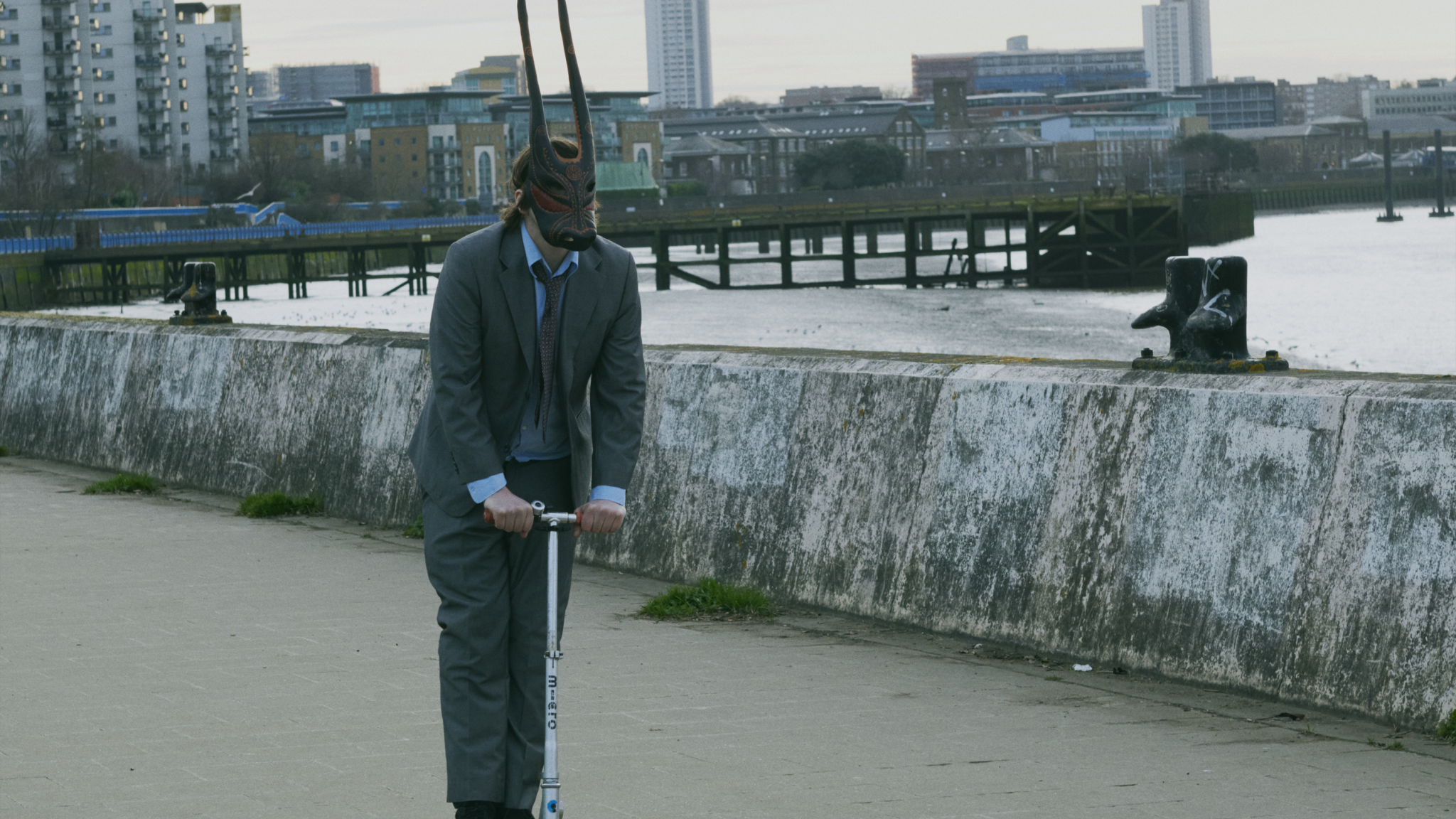There’s a moment when the German songwriter and musician who goes by the stage name Lambert and always wears a mask in public, casually switches into third person during our interview.
It’s when he recounts the backstory to his new album Actually Good, which sees him return to his trademark neoclassical style after recently releasing two jazz-influenced records.
“Well, the story starts with Lambert getting casted as the main character in a crime series. Then he starts fighting with the director. So the film never materializes, and everyone is quite happy because the script was a disaster. But the music was actually good.”
I feel reminded of the Werner Herzog movie My Best Friend about the director’s hate-love relationship with the eccentric actor Klaus Kinski, and of Björk’s prominent fallout with Lars von Trier on the set of Dancer in the Dark.
I verbalize these thoughts; Lambert adds Terry Gilliam’s Lost in La Mancha, a making-of documentary about Gilliam’s attempt to make a film that failed in the end.
There’s a reason why he’s so deeply interested in failure: It’s an important aspect of his own career. In fact, he was on the verge of giving up music when he hadn’t found any success by the age of 30.
“I failed so many times before I found my way and what I really want to do”, he admits. “My first solo album under the Lambert alias was supposed to be the last try. I was actively thinking about getting a job. But the album’s success allowed me to finally live off my music.”
That was in 2014, but the story of the musician goes further back to his childhood in Hamburg, where he started playing piano at age 5.
Listening to classical music at home and Beatles tapes in his parents’ car, little Lambert went through a strict classical piano school, switching to jazz in his early teens. “I hated having to stick to the notes”, he laughs. “When I discovered jazz, I realized I wouldn’t need to.”
While his parents listened to Liszt and Chopin, Lambert played everything from Bob Marley to the Red Hot Chili Peppers. “Pop music was a way to develop my own identity. I liked Nirvana, because they were loud and my parents hated them.”
When he wanted to switch from piano to drums, his parents offered him a deal: They would pay for drum lessons if he promised to continue on the piano as well.
Throughout high school, Lambert played in various bands, but none of them stayed together for long. “I would have loved to be part of some kind of movement”, he says. “Even today, when I see young bands that share a vision, a style, even a political attitude, then I feel a bit of envy.”
For a long time, Lambert believed his true calling was to be a jazz musician. Studying jazz piano seemed like an obvious choice. After finishing his degrees, he moved to Berlin, where he lived on pizza slices in a shared flat, playing in bars for small change on most nights.
“Berlin was a good place for that lifestyle”, he recalls. “Cost of living was cheap. When you’re in your early 20s, being a starving musician is still perceived as cool, but at a certain point, you notice people’s attitudes change. I was seriously affected by that.”
Lambert started dabbling in songwriting and production and formed an indie pop duo with a fellow musician. They managed to land a short-lived indie record deal.
“I did a few things that might have worked – but in the end, they didn’t”, he says. “Still, I think my biography is pretty common for a musician.”
Starting the Lambert project in the early 2010s, he relied on his strong sense of melody which was schooled in pop. “I wanted to write hits – melodies that people can recall and sing along with, that stay in their head.”
In the crowded field of neoclassical music, where artists are often focused on creating atmosphere and layering harmonies, Lambert made sure he wouldn’t just become another faceless piano composer. With each of his albums, he developed a new musical concept, a storytelling angle, and a unique live show.
After years of successfully releasing albums and growing his presence, he rediscovered his jazz roots during the pandemic and released two records that clearly differed from the aesthetic he’d become known for – All this Time and Live in Amsterdam.
“It was important to me to make these records”, Lambert says looking back. “Even if they didn’t get the same attention as my other projects.”
His new album Actually Good marks a return to his trademark style and a continuation of his lauded 2019 work True. Whether it was really supposed to be a soundtrack to a movie that never happened, doesn’t actually matter – it’s an intriguing story, and that’s all.
I ask Lambert about his mask that he hasn’t lifted in over ten years, and he surprises me by saying that it was never even about anonymity for him in the first place.
“There’s this demand for authenticity in music today, and I’ve always tried to fight that, because at this point, being authentic is just another staged pose”, he explains. “I could never see myself as one of these artists. In that sense, wearing a mask is the most honest thing that I can do – it highlights that this is a performance.”
by Stephan Kunze

